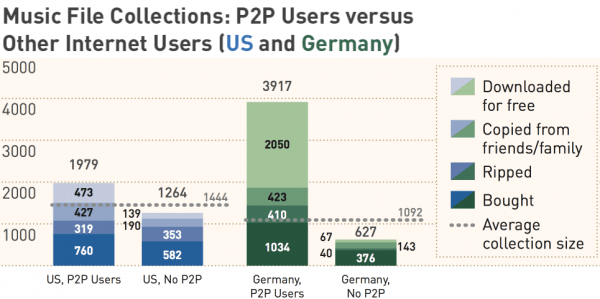Despite being condemned as thieves by the recording industry, peer-to-peer users spend more money on music than non-filesharers, according to a new study by The American Assembly. Examining the music collection habits of respondents across the US and Germany, the report found that P2P users in both regions have libraries that are larger than non-P2P users – 37% larger in the US and even more so in Germany.
This is hardly surprising as it's relatively easy to amass digital files from torrents, filelockers and copying data from friends and family. However, the research indicates that those who share music also purchase significantly more than their non-filesharing counterparts do. In the US, P2P users reportedly buy 30% more music than non-P2P users, while German filesharers purchase nearly three times more than non-filesharers.
The study also found that illegally downloaded music represents a relatively small part of users' collections. In the US, folks aged 18-29 pirated the most with about 21% of their music from illegitimate online sources. That number is roughly halved as you climb to higher age groups. Interestingly, young people in the US copy almost as much music from friends and family as they download for free, which raises additional questions about how effective bills such as SOPA would be at combating filesharing, as much of it occurs offline.

Current internet-based enforcement proposals, whether directed against P2P users or cyberlocker sites, do nothing to deter such copying – in fact they're likely to increase it as people shift toward less exposed forms of exchange. Which raises an important question: will the major content companies be satisfied to leave this vast realm of private copying alone? By all appearances, the answer is no, no, and no. And that's a problem. There is ultimately no 'solution' to copy culture that does not lead toward a wider war on general-purpose computing – a lockdown of personal computing. --The American Assembly
The researchers conclude that if absolute spending is any indication, then P2P users value music more than non-P2P users and they're simply part of an ongoing shift toward universal access. The report notes that this change is no secret and the recording industry has been working toward commercializing the new demand via paid streaming services with some success: 29% of US respondents younger than 30 listen to most or all of their music through such streaming outfits, and 11% of them have paid subscriptions.
